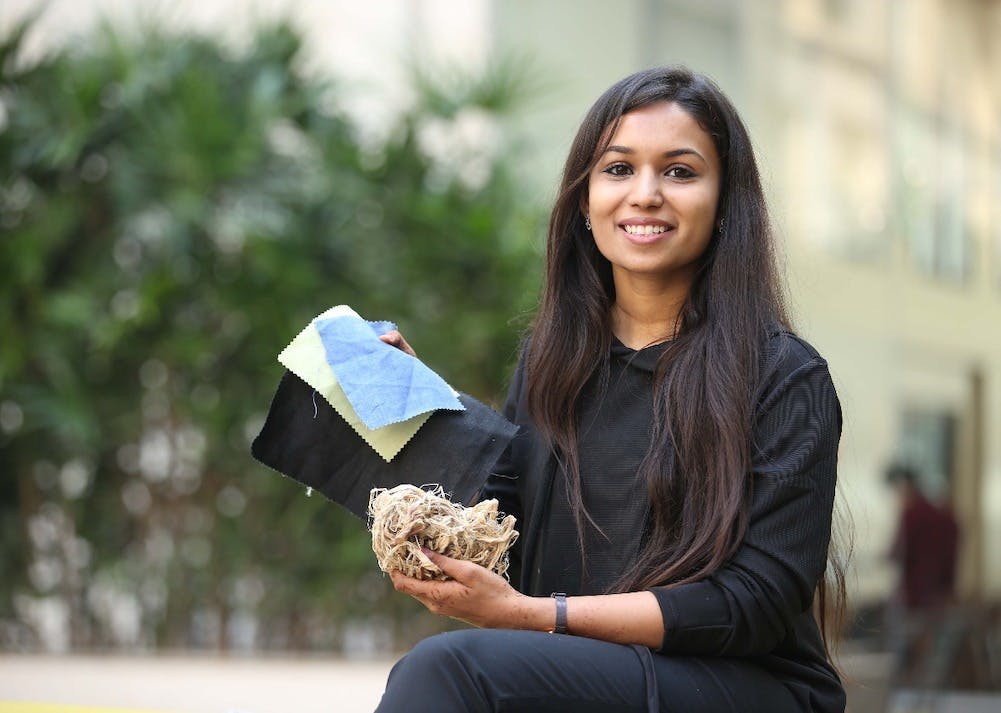
Cotton T-shirts, Polyester Dresses and Denim are featured in many of our wardrobes, but do we really know just how much our favourite items of clothing are affecting the environment? All conventional fibres that constitute our items of clothing have different environmental and social impacts and as consumers we have little insight into which materials use more energy or water, their manufacturing processes or adverse impact on garment workers. Cotton for example, is a natural fibre that is biodegradable, but is one of the most water intensive crops to cultivate and process, taking between 10,000 and 20,000 gallons of water to make a pair of jeans. Synthetic materials like polyester and nylon are usually produced from oil and plastics and therefore contribute to other detrimental environmental and social issues.
As a pioneer in the field, Shikha was inspired by her father’s factory that recycled and upcycled automobile waste like batteries into new products. Her fascination with materials and climate action was ignited at an early age, leading her to explore the creation of alternative materials in her hometown of Ahmedabad, a textile hub since the British Raj in India. Her curiosity and innovation lead to the creation of ‘AltMat’, a company part of the Fashion For Good South Asia Programme, that converts agricultural waste into alternative materials for textiles and other use, with the vision to provide the fashion industry with more sustainable materials with which to produce apparel, home textiles, accessories and more.
Shikha outlined the problem stating that traditionally, agricultural waste is burnt or destructively disposed of by farmers, creating pollution and increasing carbon emissions. Similarly, in the textile industry, every aspect of the supply chain is very polluting with a lot of credit being given to materials like polyester or cotton that constitute many items of apparel and accessories. AltMat therefore, acts as the ‘plugin’ between these two industries, taking the waste that otherwise would contribute to more pollution, and processing it in a way that it creates materials that are biodegradable, less water intensive and require much less energy to produce. AltMat pride themselves on using non hazardous chemicals in the process and have an Effluent Treatment Plant, so all water used is treated and safe to be reused.
‘Your control of the input (material) is the first step to a more sustainable output (the garment or item produced). The natural fibres used are typically from hemp plants or banana waste and are not regenerated, or made synthetic in any way. The output yarns or fabrics are great when it comes to performance. They are already naturally antibacterial, compared to other materials that require a chemical treatment to reach this stage. Similarly when washing these fibres, due to their natural composition they have a naturally longer life than synthetic fibres that have chemical coatings that tend to be washed off more easily.’
AltMat’s new factory opening this month, will have the capacity to produce up to 800 tonnes of fibres, resulting in 2000 tonnes of yarns, which is one of its kind and scale in the entire country. Shikha highlighted that there is definitely demand for this alternate material based yarn especially from manufacturers and Global Brands producing denim, home textiles, apparel and accessories. She mentioned that consumers in India are less aware of the adverse effects of the fashion industry in comparison to European or American brands and consumers, yet there is definitely a growing awareness of climate action, environmental degradation and more sustainable options among locals in the last few years. Some of the byproducts produced by AltMat are also interestingly suitable replacements within the paper or packaging industries, as well as the biochemical and energy generation as a byproduct of their own processes.
AltMat also positively contributes to the local farmer networks, providing them with additional income in return for the agricultural waste that they typically dispose of and positively changing behaviours to less waste within the agricultural industry.
SHIKHA’S TIPS TO CONSUMERS
Be more curious and ask more questions. Learn more about what you are buying. ‘Where is my shirt coming from?’, ‘What is it made of?’, ‘What is the impact of that material?’
When you do that, you attach more value to the items you are buying and will appreciate slow fashion more. Right now we do not put any effort into buying fast fashion and as a result we are hardly attached to our clothes. But imagine, if we put more effort into our choices, and ask more questions about what we are buying, automatically we would value our items more.